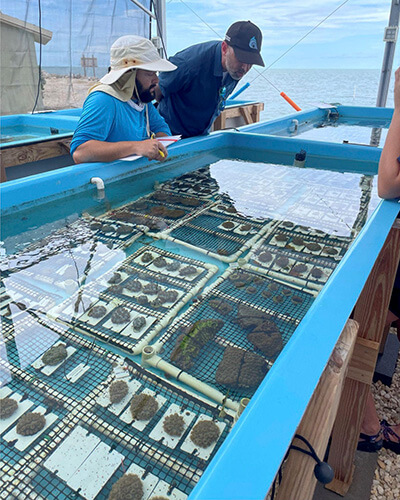
NOAA and FWC protocols guide return of temperature-threatened corals to their Mission: Iconic Reefs in-water nurseries
CONTACT: Dawn.Desmarais@noaa.gov
Mission: Iconic Reefs Communications Manager & Field Support
November 8, 2023 (Key West, FL.) – NOAA and Florida Fish and Wildlife Conservation Commission (FWC) are guiding Mission: Iconic Reefs (M:IR) restoration partners with coral return protocols to help ensure the safe and efficient return of thousands of corals evacuated from their shallow in-water nurseries to land-based facilities this July. This summer's historic marine heatwave prompted the emergency removal and massive collaboration between M:IR partners and multiple additional practitioners in order to safeguard the genetic diversity of Florida's coral reef-building species.
The new protocols outline temperature markers, coral health check procedures, transportation methods, and monitoring requirements. Ocean temperatures at in-water nursery locations must be below 87 ̊F for at least seven days and must be cleared of all diseased or dead corals before evacuated corals can be returned. An official Coral Health Veterinarian will conduct on-site health checks and provide a 30-day reintroduction certification. Transport protocols ensure that holding containers do not exceed 87 ̊F, are shaded, offer appropriate space, and are inspected at the end of transport. Corals that show signs of distress, such as tissue loss or excessive mucus, will be quarantined on land.
Restoration partners Coral Restoration Foundation, Mote Marine Laboratory, and Reef Renewal began the return efforts in late-October, using the protocols to transport corals from temporary safekeeping at land-based facilities at Mote in Sarasota, Summerland, Islamorada, and Key Largo; Keys Marine Laboratory; FL SeaBase; The Reef Institute; Aquarium Encounters; and Plant a Million Corals. The corals will be closely monitored for disease, predation, and mortality for a 30-day minimum in order to reduce stressors they may encounter when they are later outplanted on the reef, help stave off disease outbreaks, and help prevent introduction of pathogens into the wild.
Assessment of coral health ongoing

In mid-August, NOAA's M:IR Monitoring and Assessments Team conducted a 10-day assessment at segments of all seven iconic reef sites in Florida Keys National Marine Sanctuary (FKNMS) to document the condition of the outplanted corals. At every location, the team observed fully bleached and recently dead corals. Most sites had pockets of corals that were only partially bleached, and in some cases, completely unbleached corals were observed. Boulder corals showed much less bleaching and minimal mortality, as compared to the branching elkhorn and staghorn corals. Approximately 30% of outplanted staghorn and 45% elkhorn coral surveyed died, most likely due to heat stress. Approximately 90% of elkhorn and staghorn corals surveyed exhibited signs of heat stress with bleaching, partial bleaching, or paling of the tissue.
The assessment results are preliminary due to eight additional weeks of high temperature stress that occurred after the survey was conducted, which may have further impacted coral bleaching and mortality. A follow-up cruise is planned for February 2024, and data from both cruises will help NOAA biologists understand the full extent of the marine heatwave impacts and inform future Mission: Iconic Reefs restoration strategy. Outplant method, temperature trends, bleaching thresholds, site comparisons, and survival and mortality rates by age and outplant dates are variables that will be considered.
Corals that remained in the in-water nurseries and survived the heatwave will be considered for outplanting on a case-by-case basis under approval by FKNMS. Those corals will be outplanted to portions of M:IR sites where restoration efforts have not taken place; their health and success will be tracked separately from pre-heatwave restoration areas.
Additional guidance will be provided for future outplanting and monitoring by NOAA/FWC officials, who continue to assess conditions of Florida's Coral Reef after the unprecedented heat wave.

